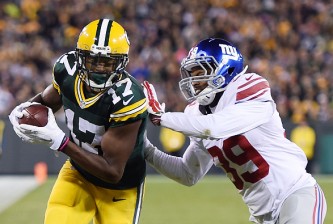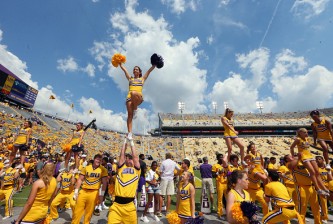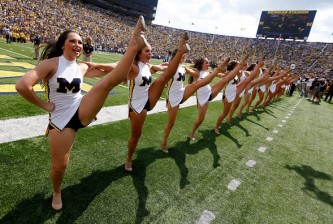Back in 1972, a group of NHL All-Stars took on the powerful national team from the Soviet Union in an eight game series that was known as the Summit Series. Western media thought the Canadian team would walk over the USSR and after the first three minutes of Game 1, it certainly looked that way, but the Soviets stormed back and took it, 7-3. From then on, the Canadians knew that they were in for a fight. Canada took the series, 4-3-1, but not after struggling to combat the Soviet style of play.
NBC Sports Network will air a documentary called “Cold War on Ice” produced by former HBO Sports President Ross Greenburg. The documentary, which will air on the first day of NBC Sports Network’s launch on January 2, 2012 at 4:30 p.m. ET, will have interviews with some of the Canadian players including Bobby Clarke who was known for a controversial play in Game 6, Phil Esposito and Game 8 game-winning goal scorer Paul Henderson. There will also be interviews with players from the Soviet team including goaltending legend Vladisov Tretiak,
Actor Peter Coyote who has voiced many documentaries and commercials will be the narrator for this new look at the Summit Series.
We have the press release from the NBC Sports Group.
“COLD WAR ON ICE: SUMMIT SERIES ’72” AIRS ON NBC SPORTS NETWORK DEBUT DAY ON JANUARY 2
90-minute film presented by Lexus with limited commercial interruption focuses on historic 1972 hockey series between Canadian NHL All-Stars and U.S.S.R National Team
Interviews Include: Team Canada Coach Harry Sinden; Players Phil Esposito, Tony Esposito, Rod Gilbert, Bobby Clarke, Paul Henderson; Soviet players Boris Mikhailov, Vladislov Tretiak, Alexander Yakushev
Film Produced by 51-time Emmy Award-winner Ross Greenburg
Part of NBC Sports Network’s DAY 1 Schedule
“I really thought it was going to be an all star game. We were going to have some laughs and some fun.” – Phil Esposito on the series
“I don’t know what I was thinking at all. It was an awful thing to do. It sure felt good.” – Bobby Clarke on slashing Russian Star Valeri Kharlamov, breaking his ankle.
“It’s the closest I’ve ever come to kissing a man.” – Phil Esposito on Henderson’s game-winning goal in Game 8
“COLD WAR ON ICE: SUMMIT SERIES ’72” IS AN NBC SPORTS GROUP ORIGINAL PRODUCTIONNEW YORK – December 28, 2011 – Cold War on Ice: Summit Series ’72, a 90-minute documentary with limited commercial interruption, will be a featured component in the launch of the NBC Sports Network as it debuts at 4:30 p.m. ET on Monday, Jan. 2, 2012, the same day the channel is re-branded from VERSUS.
Cold War on Ice, produced by 51-time Emmy Award-winner Ross Greenburg, chronicles the historic 27-day Summit Series in September of 1972 between a team of NHL All-Stars from Canada and the Soviet National Team during the height of the Cold War.
“It is an honor to present this unique story as the first original program on the new NBC Sports Network,” said Greenburg. “This historic confrontation between the Canadian National Team and the Soviet Union was a battle of two cultures both on and off the ice. This was a defining moment in hockey and NHL history. It is exciting to give this story the platform it deserves.”
Team Canada was composed of the National Hockey League’s greatest stars, expected to easily defeat the Soviet team. In fact, on the eve of the ‘good will’ eight-game series, the Montreal Gazette published predictions from people inside the hockey world. The great majority of those polled shared the opinion of all-star goalie Jacques Plante and New York Times Hockey writer Gerald Eskenazi, who both claimed that the NHL squad “will slaughter them in 8 straight.”
The event left its stamp on the national psyche of Canada and the entire National Hockey League. Hockey is not a sport in Canada; it is a matter of national pride, and what started as a friendly exhibition series turned into a microcosm of the Cold War. It was a dramatic confrontation that jumped the Iron Curtain to pit the east against the west, communism against capitalism, and good vs. evil.
Phil Esposito of the Boston Bruins scored past Soviet goaltender Vladislav Tretiak just 30 seconds into Game 1 (at the Montreal Forum). Team Canada went up 2-0 five minutes later. Team Canada’s predicted rout was on as the entire nation watched.
The country’s mood would quickly change as the Soviet’s went on to completely dominate the rest of the game. They mesmerized the NHL squad with their precision playmaking, effortless skating, and intricate offensive attack, and stunned Team Canada by charging back to win Game 1, 7-3.
The Soviets were disciplined and relentless and their three third-period goals signified their superior conditioning. The NHL squad was rested, coming off a summer off-season, and they were completely outworked and dominated by the Soviets, who competed at the highest level, all year round. The pre-series predictions were thrown out the window and the war was on.
Team Canada bounced back to take Game 2 of the series, 4-1 (Maple Leaf Gardens in Toronto), and led Game 3 (Winnipeg Arena) by two goals late in the third period, until the Soviets scored two late goals to end Game 3 in a 4-4 tie.
Team Canada played poorly in Game 4 in Vancouver, losing 5-3.
The crowd of 16,000 booed Team Canada off the ice in Vancouver. Feelings of frustration had turned to anger as the Canadian faithful felt that the poor play of Team Canada was both embarrassing and shameful. In response to the overwhelming negative public and media reaction, Phil Esposito called out the fans for their conduct.
“We are absolutely giving it our all and we are really disappointed in you (fans),” said Esposito, the captain of Team Canada after Game 4. “We cannot believe…were trying like hell. Canada is our home and it is just not fair. It is totally ridiculous that we are being booed.”
The series shifted to the Soviet Union for the remaining four games of the series as Team Canada contemplated the end to its perceived dominance in the sport they so dearly love, but not before a two-week European hiatus in which Team Canada played two exhibition games against the Swedish national team in Stockholm.
The second game against Sweden featured many fights. Team Canada was criticized by the Swedes for their ‘goonish’ style of play, but these two games along with Esposito’s impassioned speech, helped galvanize the NHL team. The Canadian squad was made up of players from different NHL teams, many of who hated each other, but now were coming together because of a common enemy, the Soviets.
While the final four games of the Summit Series were hosted by the Soviets, more than 3,000 Canadian fans accompanied the NHL squad. Team Canada got out to a 4-1 lead in Game 5, but the Soviets scored four unanswered goals to win that game, 5-4, and take a 3-1-1 lead in the series.
Team Canada would now have to win all three remaining games to win the series. Despite the backbreaking loss, and the apparent stranglehold they had on their game, all 3,000 fans sang “Oh Canada” as Team Canada left the ice after Game 5.
Prior to Game 6, the Canadian team became upset over a shipment of beer they believed that the Soviets had deliberately “lost” at the airport. They took any additional incentives they could get and Team Canada held on for a 3-2 win. Unheralded Paul Henderson scored what turned out to be the game-winner late in the second period. This game also featured the most controversial play of the series. Philadelphia Flyers Bobby Clarke was instructed by Team Canada’s bench to stop the high-flying Soviet star and captain, Valeri Kharlamov. During his next shift Clarke deliberately slashed Kharlomov and broke his ankle.
“He was killing us and somebody had to do it. This is war. It is us versus them and the guy was killing us.” said Clarke after the game.
Team Canada would capture Game 7, 4-3, with Paul Henderson once again scoring the game-winning tally late in the 3rd period. The game also featured a controversial rebuttal by the Soviets, as Boris Mikhailov used his skate as a weapon and kicked Team Canada’s Gary Bergman twice during an on-ice altercation.
GAME 8, WITH SERIES TIED 3-3-1
Team Canada was down by two goals heading into the third period of the decisive Game 8, and the Soviets were on the verge of laying claim to Canada’s national sport.
Team Canada however came out roaring in the third period and tied the score at 5-5 with the series tied 3-3-1.
In the final minute of play Esposito got off a good shot and Henderson, the journeyman turned hero, who later said he knew he was going to score, put the rebound past Tretiak in perhaps the single most-famous moment in Canadian sports history. The “Goal Heard Round the World” became one the countries most endearing images, one that is as fresh and vivid to the entire nation 40 years after that late September day in 1972.
In the end, the Summit Series proved that the gap between the best Canadian NHL players and the top players in Europe was much narrower than most observers on both sides realized. The success of the series led to the Super Series, where Soviet clubs played NHL clubs on numerous occasions throughout the 1970’s and eventually the immersion of many Soviet players to the National Hockey League in the 1980’s.
INTERVIEWS FOR “COLD WAR ON ICE”
Subjects include – Team Canada Coach Harry Sinden; Players Phil Esposito, Tony Esposito, Rod Gilbert, Bobby Clarke, Paul Henderson, Peter Mahovlich, JP Parise; Soviet players Boris Mikhailov, Vladislov Tretiak, Alexander Yakushev.
ON PLAYING FOR TEAM CANADA:
Clarke: “It was certainly an honor to wear the Canadian jersey, but it was also supposed to be a vacation almost. It was supposed to be a cakewalk for Canada”
Phil Esposito: “I really thought it was going to be an all star game. We were going to have some laughs and some fun.”
Henderson: “It was going to be a wonderful experience to be able to play with the Espositos, Cournoyer, Savard, Lapointe, and get to enjoy their ability and be on the same ice with them. The other side of the coin is, anyone who kept you from winning the Stanley Cup you didn’t like them, and you had to bump heads with them.”
Tony Esposito: “They were your rivals and a few of the guys you really didn’t like. We weren’t a team; we were just a bunch of guys thrown together. So when we went over there (to Russia for games four through eight), that’s when we really gelled.”
ON THE RUSSIANS STEALING THE CANADIAN’S BEER:
Phil Esposito: “They stole our beer. We had to drink vodka. Homemade vodka. You ever taste homemade vodka? Go into your garage and get turpentine and drink it. Holy cripe it is bad.”
ON BOBBY CLARKE SLASHING RUSSIAN VALERI KHARLAMOV IN GAME 6, BREAKING HIS ANKLE:
Clarke: “I don’t know what I was thinking at all. Obviously I wasn’t. I chased him down the ice and wacked him.”
Henderson: “That’s the way Clarkie played the game. Probably on that team he was the only guy that would go out there and do something like that. But he would’ve done that for the Philadelphia Flyers. That’s who he was. He wasn’t out of character. He was so competitive that he would push his grandmother down a flight of stairs to win a hockey game.”
Phil Esposito: “The only thing I regret about that is he didn’t do it in the first game. Are you kidding me? Are you KIDDING me? That’s part of the game and I have no problem with it. None, you understand? This is war.”
Clarke: “As I said often, it was an awful thing to do. It sure felt good.”
ON PLAYING RUSSIA DURING THE COLD WAR:
Henderson: “They were challenging us as a people, and certainly as a hockey empire.”
Mahovlich: “The Cold War. The us-against-them attitude was certainly what this turned out to be.”
Phil Esposito: “I would’ve killed those son of a bitches to win. It scares me every time I think about it.”
ON HENDERSON SCORING THE GAME-WINNING GOAL IN GAME 8 GIVING TEAM CANADA THE SERIES WIN:
Parise: “We went nuts.”
Clarke: “Ecstatic, but there was also a real…whew…relief.”
Phil Esposito: “It’s the closest I’ve ever come to kissing a man. Really kissing him. I loved that man that moment. I did.”
CREDITS:
Producers: Ross Greenburg, George Roy, Steve Stern
Director and Editor: George Roy
Writer: Steve Stern
Narrator: Peter Coyote
Here’s a promo narrated by Peter Coyote on the documentary.
That’s it.






















